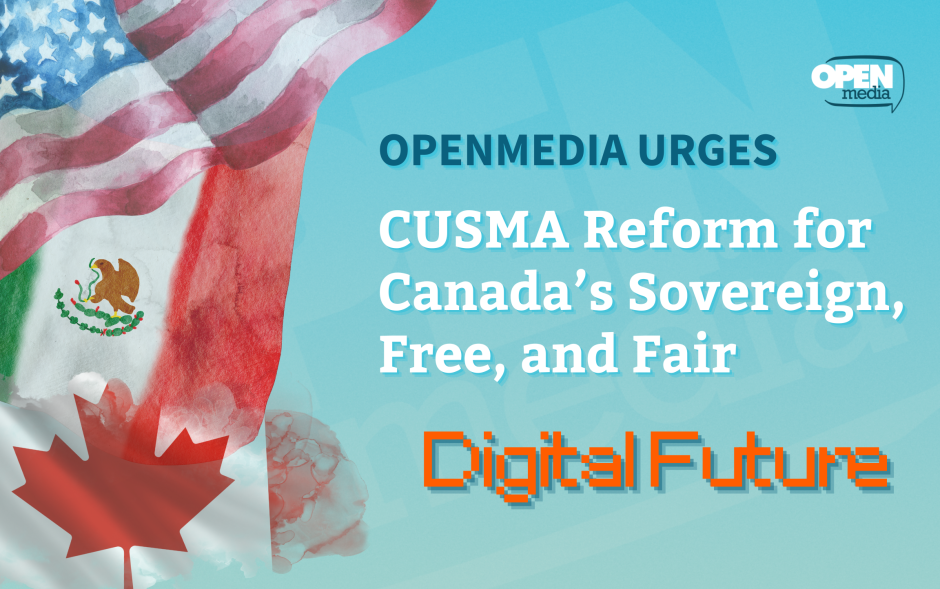OpenMedia Urges CUSMA Reform for Canada’s Sovereign, Free, and Fair Digital Future
The 2026 CUSMA review gives Canada the chance to reclaim digital autonomy by strengthening intellectual property, improving platform accountability, and defending a free, open, and fair internet.
On November 3, 2025, OpenMedia submitted written inputs to the consultation on the operation of the Canada-United States-Mexico Agreement (CUSMA). In this submission, we outlined what Canada should fight to reclaim Canada’s policy independence for during upcoming CUSMA renegotiations. These recommendations draw on more than 15 years of work with our community of 240,000 people across Canada who care deeply about building an open, affordable, surveillance-free, and democratic internet.
Our submission focuses on how Canada can strengthen our digital sovereignty at a time when Big Tech giants are consolidating power, geopolitics are shifting, economic pressures are growing, and AI development is accelerating in ways that affect almost every part of our lives.
While maintaining tariff-free market access is an important objective, we believe that it cannot be the only priority for Canada. CUSMA’s digital trade rules (Chapters 19 and 20) were shaped by older U.S. laws designed for a different technological era. Today, they lock in policies that favour foreign tech and content giants, often at the expense of Canadians’ privacy, online safety, and digital rights.
In a modern digital economy, a country cannot call itself digitally sovereign if it cannot protect its people's personal data, ensure fair compensation for how their data is used, or regulate the algorithms and information feeds that shape our lives.
We’ve identified three core areas of concern where CUSMA’s provisions are in direct conflict with both Canada’s national interest and the principles of a free, open, and fair internet:
- Digital Sovereignty: CUSMA prohibits data localization (Article 19.12) and shields proprietary source code (Article 19.16) in ways that prevent Canada from requiring certain sensitive data to be stored here at home, or from fully regulating AI and algorithmic systems. These rules give foreign companies and legal systems too much control over Canadians' data and the governance of critical technologies. Further, our U.S. partner is no longer willing to tolerate these limitations on its own sovereignty vis-a-vis foreign companies, recognizing the sensitivity of both subjects to their national interest; Canada should not accept restrictions the U.S. would not accept on itself in our mutual agreement.
- Intellectual Property: CUSMA’s mandatory extension of Canada's copyright term to "life of the author plus 70 years" (Article 20.63) has imposed significant and mounting economic and cultural costs on Canadians, to no benefit for our culture. This policy enriches large, often foreign, corporate rightsholders at the expense of the public domain, raising costs for education, libraries, and archives while stifling innovation and new creative works that build on Canada’s shared cultural heritage.
- Platform Accountability: CUSMA’s platform liability rules (Article 19.17), modeled on the U.S. Section 230, lock Canada into an outdated approach. While these rules rightly protect free expression, their rigid design makes it harder for Canada to introduce modern, process-based regulations to address systemic online harms and hold platforms accountable for their design choices. This creates a policy paradox where Canada is bound by a rule that many lawmakers in the U.S. are actively seeking to reform.
We recommended that the Government of Canada pursue the following objectives during the CUSMA joint review:
- Seek a binding joint interpretation confirming that Chapter 19 does allow non-discriminatory measures to protect personal data, ensure algorithmic transparency, and regulate AI.
- Obtain amendments to Article 19.12 to create specific carve-outs allowing for data localization requirements for sensitive personal information and data related to critical infrastructure.
- Firmly resist any further expansion of intellectual property protections and champion the importance of balanced user rights, such as Canada’s fair dealing provisions;
- Secure a joint interpretation of Article 19.17 that allows Canada to introduce content-neutral, process-based platform rules, such as risk assessments, transparency reporting, and user empowerment tools that are in line with emerging global standards.
By pursuing these reforms, Canada can ensure that CUSMA evolves to support, rather than restrict, its ability to build a sovereign, free, and fair digital future for all Canadians. If you’d like to read our full submission, you can find it here.

 Take action now!
Take action now!
 Sign up to be in the loop
Sign up to be in the loop
 Donate to support our work
Donate to support our work